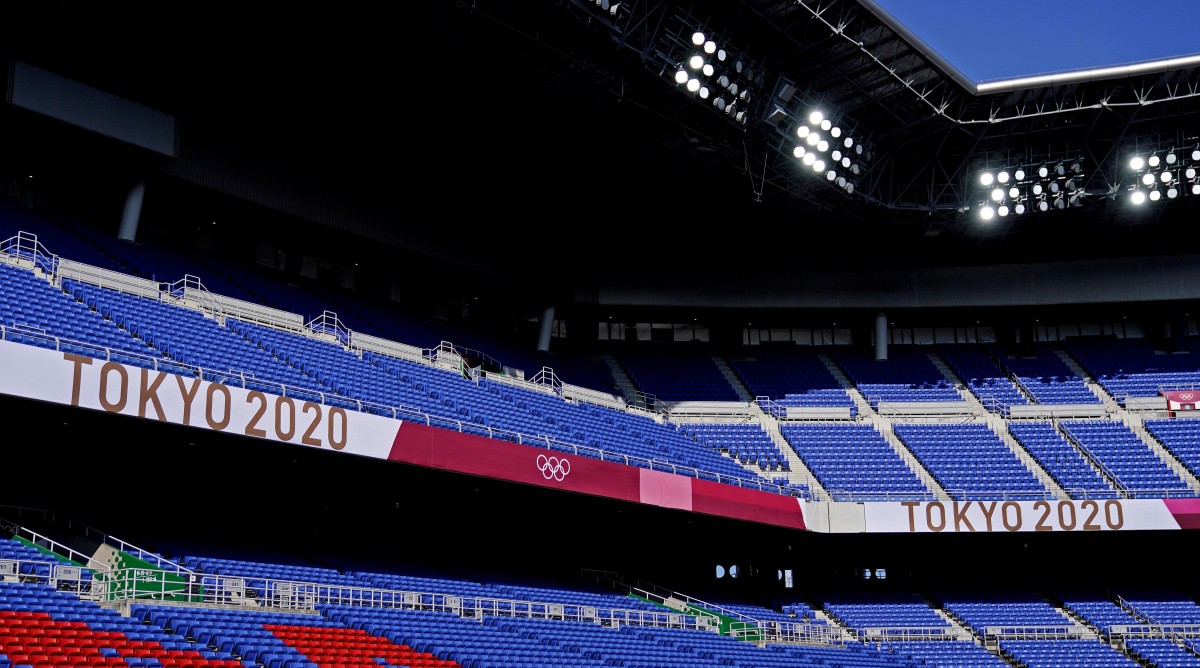This Is Not the Olympics Japan Hoped For
Sign up for our free daily Olympics newsletter: Very Olympic Today. You'll catch up on the top stories, smaller events, things you may have missed while you were sleeping and links to the best writing from SI’s reporters on the ground in Tokyo.
TOKYO — Thursday night, in a virtually empty stadium beneath a nearly full moon, Japan’s Olympics never began.
At 7:15 p.m., the Japanese men’s soccer team walked onto the field without cheer or cheers. COVID-19 has basically made these a spectator-free Games. Most parking spots around Tokyo Stadium were empty. The pulsing noise outside came from evening cicadas. When the speakers finished playing Japan’s national anthem, the applause did not reach the level you might hear at a middle-school musical. During the game, you could hear camera shutters catching moments that Japan is anxious to forget.
Two years ago to the day, hundreds of local children and their parents gathered on this same field, holding blue placards and forming the words: “One Year to Go.” The Tokyo 2020 Olympic and Paralympic mascots, Miraitowa and Someity, were there, too, along with robotic versions of the mascots created by Toyota. Nobody had any idea that one year would turn into two; that the Olympics would become anathema to the Japanese; that Toyota would pull its advertising to distance itself from the event; or that the crowd that day would be one of the biggest of these Olympics.
Japan won its first match, 1–0, over South Africa, but the country has already lost interest in Olympic joy. What is the fun of hosting an event nobody can attend? With no pandemic, the building should have been rocking, with fans pouring in from all over. But it felt like somebody unplugged the Olympics. When Japan missed a scoring chance in the 13th minute, there were no gasps; when it missed another two minutes later, there were just a few. When Takefusa Kubo finally broke through in the 71st minute, scoring with his left foot off the far post, he sprinted down the field and slid in celebration, but it was like watching a game on mute.

The Olympics are a heavy weight for any citizenry, and they are rarely worth the lift. They usually cost billions before they begin and leave venues abandoned soon after they end. But the Olympics themselves can be magical. They really do bring people together, and that is not meant in the loaded, intellectually dishonest way: implying that differences no longer matter, and everybody suddenly likes each other and will forever. They literally bring people together. Memories form and harden. There is nothing quite like the sense the whole world is watching what is happening in your neighborhood. And competing for your country in your country is the rarest of athletic treats.
Forget the dateline atop this column. This soccer game could have taken place anywhere. Tokyo, Kyoto, Topeka, a Hollywood set. It would have made no difference.
The Japanese are no longer invited to their own party. Even sadder, but understandable: They don’t want the party at all. Japanese coach Hajime Moriyasu talked after his team’s win about how much he would have loved to have fans at this game. But with rising COVID-19 cases and hospitalizations, most people here wanted the games canceled entirely, to limit the human damage.
Japan is not a men’s soccer powerhouse on the level of Germany or Brazil, but it is a tough out in any tournament. This game would have been wild with a full house of 48,000 the night before the Opening Ceremony. Instead, the only sign of passion came from the two dozen fans screaming at the team bus as it departed. The stadium itself was physically and emotionally empty.
This might explain how unpopular the Games are here:
Tokyo Stadium is actually called Ajinomoto Stadium, as part of a naming-rights deal with a large food company. The name was changed temporarily because the IOC doesn’t recognize anybody else’s sponsorship deals. Ajinomoto was hardly going to complain; the company has been an official partner of the Japan Olympic Committee for a long time. In 2016 it was introduced as an official partner of Tokyo 2020. Many elite Japanese athletes train at the Ajinomoto National Training Center.
Last month, Ajinomoto said it would not run any Olympic commercials in July. (It delayed a decision on commercials in August.)
The Olympics are toxic here now. This week, the IOC awarded the 2032 Olympics to Brisbane, Australia, and logically, there should have been an international push to hold those Games here, to give the Japanese the fan-filled, presumably pandemic-free Olympics they planned to host. But that push would have had to start in Japan, and it didn’t. The idea of hosting another Olympics is unappealing.
Most of the Japanese don’t want this.
But if you looked closely here Thursday, you could see how much they did want it.
In what would have been wheelchair seating, there were, instead, dozens of synthetic vines. They each had notes on them from Japanese schoolchildren.
Several featured the Japanese word ganbatte, which is commonly used in sports and captures the national ethos: Fight hard. One, with a drawing of Mt. Fuji, read: Let’s have a fun competition using all of your strength. Another, with a drawing of a swimmer: I am cheering from home. Everyone in the Olympics, please do your best. On another, a child drew a picture of the mascots who got those cheers in this building in 2019, in another world, when Japan was eager to host the Olympics. Two weeks to go.
More Olympics Coverage:
• The Games Go On—With a New Purpose
• Meet Team USA Athletes Competing in Tokyo
• Previewing Every Sport in the Olympics
